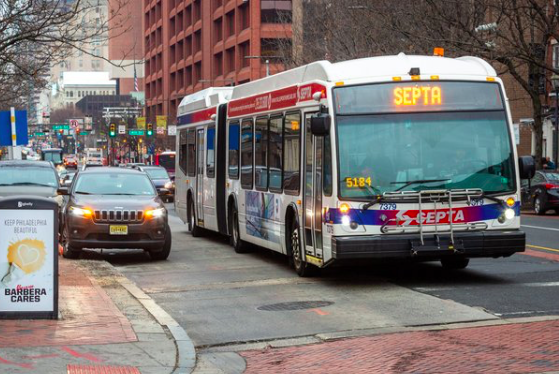
April 24, 2022
 Thom Carroll/For PhillyVoice
Thom Carroll/For PhillyVoice
Councilmember Helen Gym introduced a bill on Thursday that would require some employers to allow workers to use pre-tax income for travel expenses. The commuter benefit, if passed, would go into effect on Dec. 31.
Philadelphians returning to in-person work could soon be eligible to receive commuter benefits through their employer using pre-tax income, as City Councilmember Helen Gym introduced a bill to expand SEPTA ridership and lower costs for workers on Thursday.
The bill, which already has the support of nine members of City Council, would require any employer with 50 or more employees to allow workers to use pre-tax income to cover commuting costs. The benefit would be able to implement the commuter benefit as a tax deduction or providing a "fare instrument" for workers to load SEPTA passes. Those who travel by bike would be eligible for a $20 monthly reimbursement for qualified expenses.
The purpose, Gym said on Thursday, is to expand SEPTA's ridership and provide immediate savings to workers who are returning to the city for in-person work as COVID-19 rules are lifted. The bill could also reduce traffic congestion by enabling more workers to utilize public transit rather than opting to drive each day.
"Bringing new riders into Philadelphia's public transit network is critical both to our city's recover and safety," said Gym. "This program will make our transit system more accessible to countless Philadelphians — and we know that a busier transit system is a safer transit system."
A typical SEPTA rider using the commuter benefit would save more than $20 per month and $250 per year. Those who typically buy more expensive Regional Rail passes could save up to $1,000 per year. This, along with SEPTA's institutional pass program, are meant to revitalize SEPTA and bring back its pre-pandemic ridership.
Michael Carroll, managing director of the city's Office of Transportation, Infrastructure, and Stability, said on Thursday that the institutional pass program shows that there is "tremendous untapped demand" for increased transit use throughout the city. Carroll, also a SEPTA board member, said that the commuter benefit bill is also a way for the city's larger employers to add to their benefits packages in order to be more competitive in hiring and retaining workers.
Currently, SEPTA sees an estimated 530,000 riders each day, Billy Penn reported. Ridership is still about half of what it was prior to the COIVD-19 pandemic, costing the agency nearly $1 million each day.
Today, I introduced commuter benefits legislation to increase transit ridership and cut back on employee travel costs.
— Helen Gym (@HelenGymAtLarge) April 21, 2022
With this legislation, we'll help Philadelphians save hundreds of dollars a year, while decreasing traffic congestion and improving the safety of our streets. pic.twitter.com/9VAcJBN2mL
Commuter benefits plans have become more popular among large employers in recent years, and have been implemented citywide in places like New York City, Washington, DC, and Los Angeles, and Seattle.
Most of those cities require employers with 20 or more workers to provide the benefit in order to dissuade people from driving in each day and causing excess traffic congestion.
"Between inflation and record-high gas prices, too many Philadelphians are experiencing financial strain — and because of that, we should be doing everything we can to cut their costs elsewhere," said Councilmember Jamie Gauthier, adding that she supports the bill and Gym's efforts to help reduce the city's carbon emissions in the process.
If passed, the ordinance would go into effect on Dec. 31. Workers who discover their employer is not providing the benefit despite being eligible can report it, and the employer could face a court hearing and additional fines in order to incentivize them to comply.
The legislation will be discussed further by the Committee on Transportation before heading to City Council for a full vote.
Nick Zuwiala-Rogers, transportation program director at the Clean Air Council, noted that City Council has been attempting to convince employers to voluntarily implement a pre-tax commuter benefit for workers for years, adding that the program could dissuade residents from using single-occupancy vehicles.
"This commuter benefits legislation will undoubtedly support Philly's economic recovery, cut street congestion, support public transit, and improve out climate and air quality outcomes — all while saving money for commuters who choose an alternative to driving," said Will Tung, organizer at 5th Square.
In March, Drexel University, Wawa, and Penn Medicine agreed to buy unlimited SEPTA passes for workers through a six-month pilot program. A SEPTA spokesperson said that the institutions purchased a total of 15,600 passes.
Previous initiatives to improve SEPTA's ridership included incentive-based discounts following the omicron surge, and a proposal to make SEPTA free for children under 12 years old.